Fashion Institute of Technology Students on Campus Occupation for Palestine Protests

Anadolu/Getty Images
As protest encampments, sit-ins, and other occupations have grown across dozens of American university and college campuses, last week, New York City’s Fashion Institute of Technology (FIT) caught particular attention. On Thursday, April 25, FIT students established an encampment at the on-campus museum, with more than a hundred students recorded rushing in, according to Women’s Wear Daily. By the end of the weekend, the students had three occupations going: inside and outside of the college museum, and another in front of a busy campus building.
“It was almost like we were on exhibit — like it was our exhibit,” says Mustafa, FIT class of 2027, one of the students who slept at the museum. (The students Teen Vogue interviewed for this article requested first name identification only, citing their fear of doxxing.)
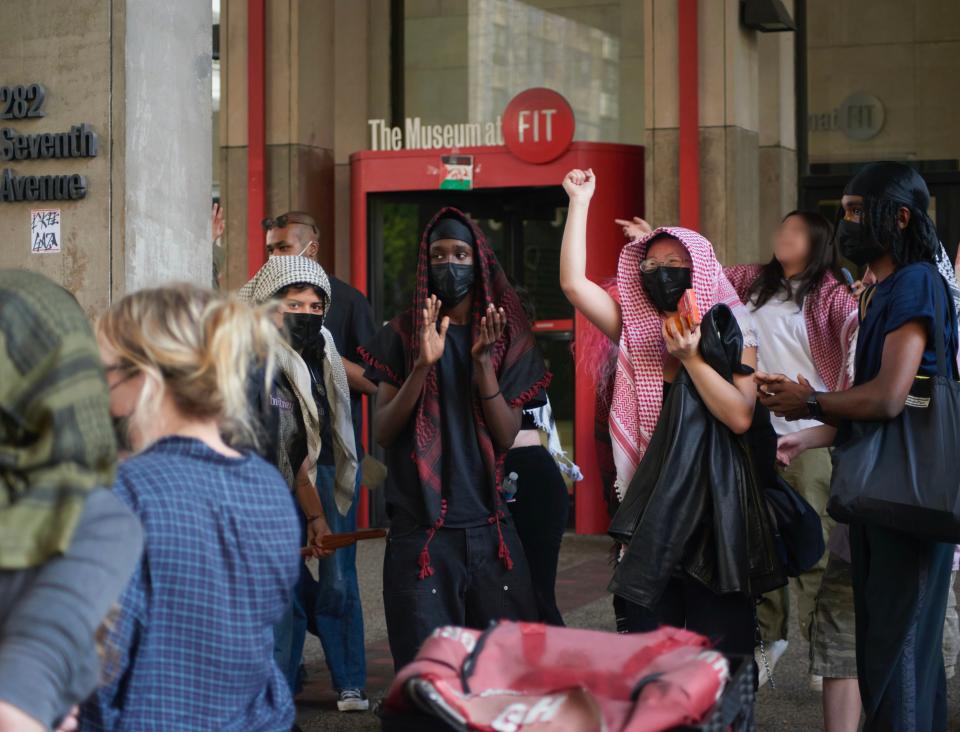
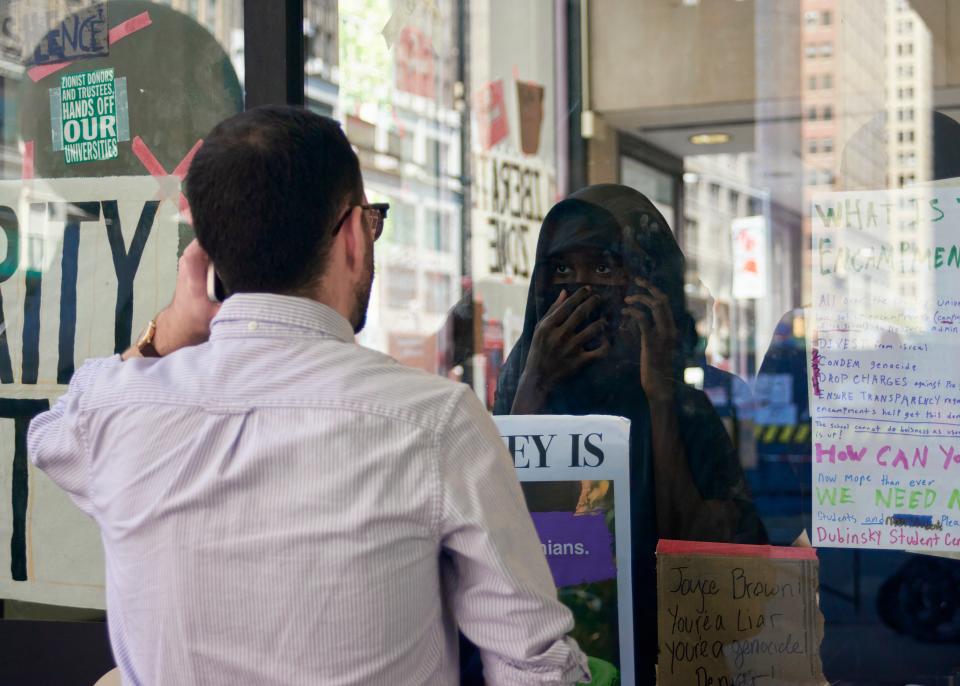
By Sunday evening, students had abandoned the museum occupation, as the school was tightly restricting access in and out, and pivoted their focus to the outdoor encampment down the street.
FIT is a part of the State University of New York system, or SUNY, and the students are seeking detailed information from the administration about FIT and SUNY’s investments. In 1985, SUNY’s board of trustees divested the system’s finances from South Africa after student organizing. (Teen Vogue has sent requests for comment to FIT and SUNY.)
Though national media coverage of protests remains largely focused on Ivy League schools, videos of students on public college campuses engaging in moments of direct confrontation, intervening in the arrests of classmates, and pushing back militarized officers in places like University of Texas Austin and Cal Poly Humboldt have also captured attention.
Teen Vogue speaks to three FIT student organizers about their approach and why they’re sticking it out.
These interviews have been lightly edited and condensed for clarity.
Teen Vogue: How did this organizing at FIT get started?
Jonas, class of 2024 (he/him): We've been meeting multiple times a week, every single week, for six, seven months now. Without doing that work there was no way this occupation or this community space would have been able to succeed with the numbers that we have.…
There was one silent protest [early on of], maybe, three or four people from the Muslim Student Union, which decided we have to say something, so they got some signs and they walked up and down [the street]. I have so much respect for them, honestly, because it was really brave.
I was thinking, I really want to organize something on campus, but it doesn't feel like there's a lot of political will in fashion. I was sitting here in the courtyard and I seen one other kid wearing a keffiyeh, and we kind of saw each other and gave each other the dab, and we're like, “Hey, we got to do something.” So we connected with the girls from the Muslim Student Union and we said, “Let's do a rally.” And we made some flyers and put them all around the school. And we got a pretty good turnout — probably, like, 400 people.
Eli, class of 2026 (she/they): I was in the museum encampment. I stayed a night there, and I got out midday the next day. Then, once this opened up, I've been sleeping out here for four days. I've been organizing for [Students for Justice in Palestine (SJP)] since November. I helped organize doing the encampment, gathering resources, planning out how exactly it was going to go down and when we're going to do it. I've also been engaged in a lot of city actions. I've been doing things since November as well, pretty much to every protest I can go to. I drum for the protests. I'm usually in the front.
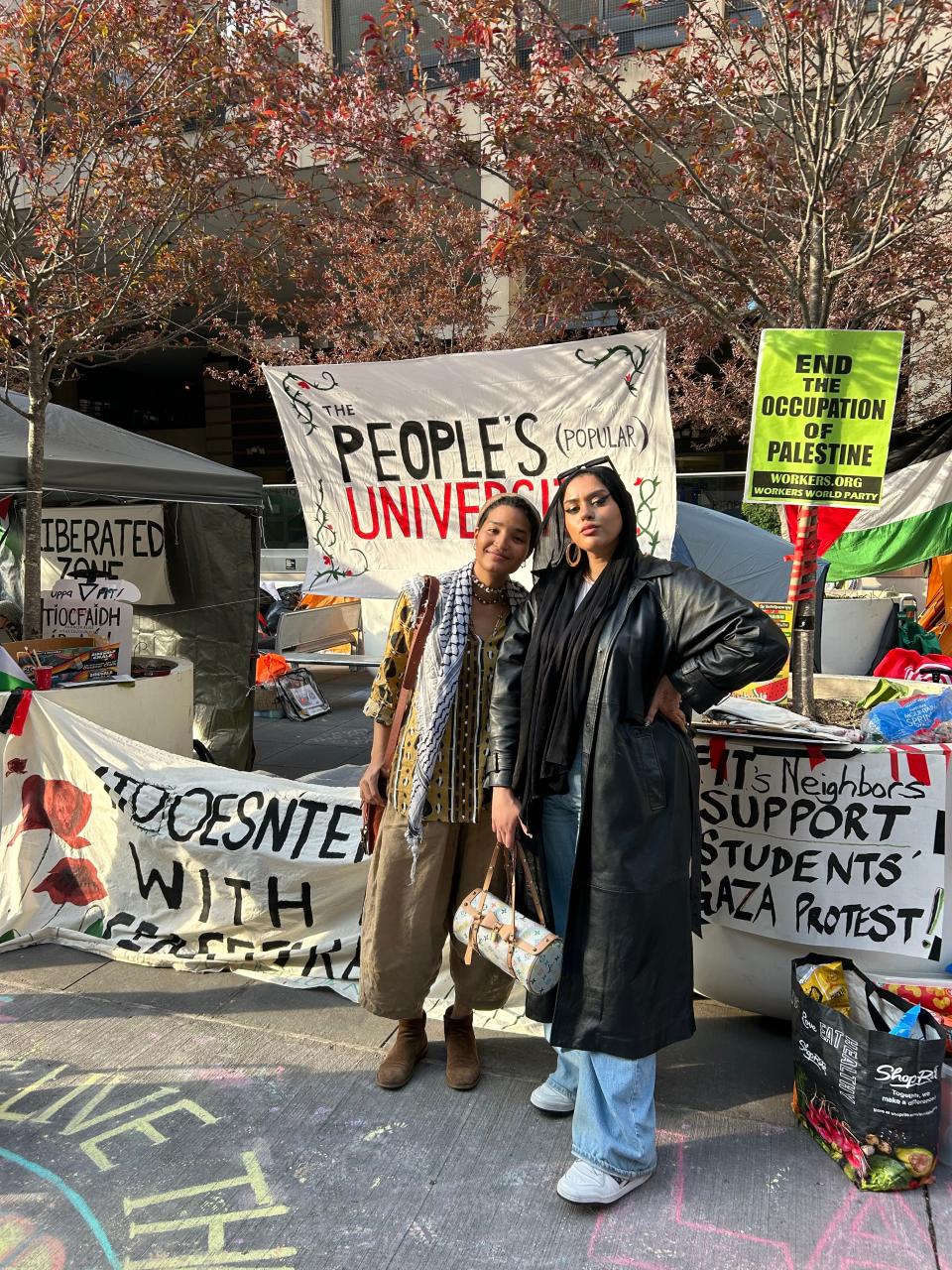
When we successfully were able to get inside the museum, I was about to tear up a little, seeing so many people show up for us and show up to our things. That we were able to successfully take it over, that meant a lot.
It's really nonstop, running an SJP or organizing, especially at a smaller school like this since we don't have a huge student body, nor do we have a lot of student engagement. I've never seen anything at FIT where students are actually coming together for anything. You won't get this type of engagement for any other club, there's nothing like it, where so many people are coming together and talking to each other.
At FIT, a lot of people complain about how it is hard to make friends. With organizing, I'm not by myself, so at the end of the day, I feel better about it. I can organize my friends and meet new people. It's stressful, but it's the least we can do for the Palestinians right now.
TV: Have people asked, “Why here at FIT?” I saw some folks online questioning the involvement of people interested in fashion.
Mustafa: There's this app called Fizz — it's this anonymous student platform where students can go on and just talk about stuff. Students have just been talking about, “What does fashion have to do with anything going on?”
Jonas: The question of why are we doing this at a fashion school? It's a bad question. Why any school? Because it's a genocide going on and we're upset about it. That gets into more local issues as well: Why do we not know where any of our tuition dollars are going? Why do we not know what our government is invested in? Why do we not have any influence? Why does our student government not have any influence on the way the school runs? What's the point of having a student government if the students don't have any power? We're the ones funding this university. At the end of the day, if there was no students, there’d be no university.
A big part of the activism that we've been doing is trying to empower the student body to [realize] we are the people and we have the power, and if we all get together and make this happen, it will happen.
Mustafa: For us to be students who go to fashion school and take up a stance and speak up about certain things that are going on around the world, whether it's genocide or slavery in our prisons... Luxury is a multibillion dollar industry. Fast fashion is a multibillion dollar industry. I mean, even sustainable fashion is a massive industry. Just having that transparency with where our money is going…
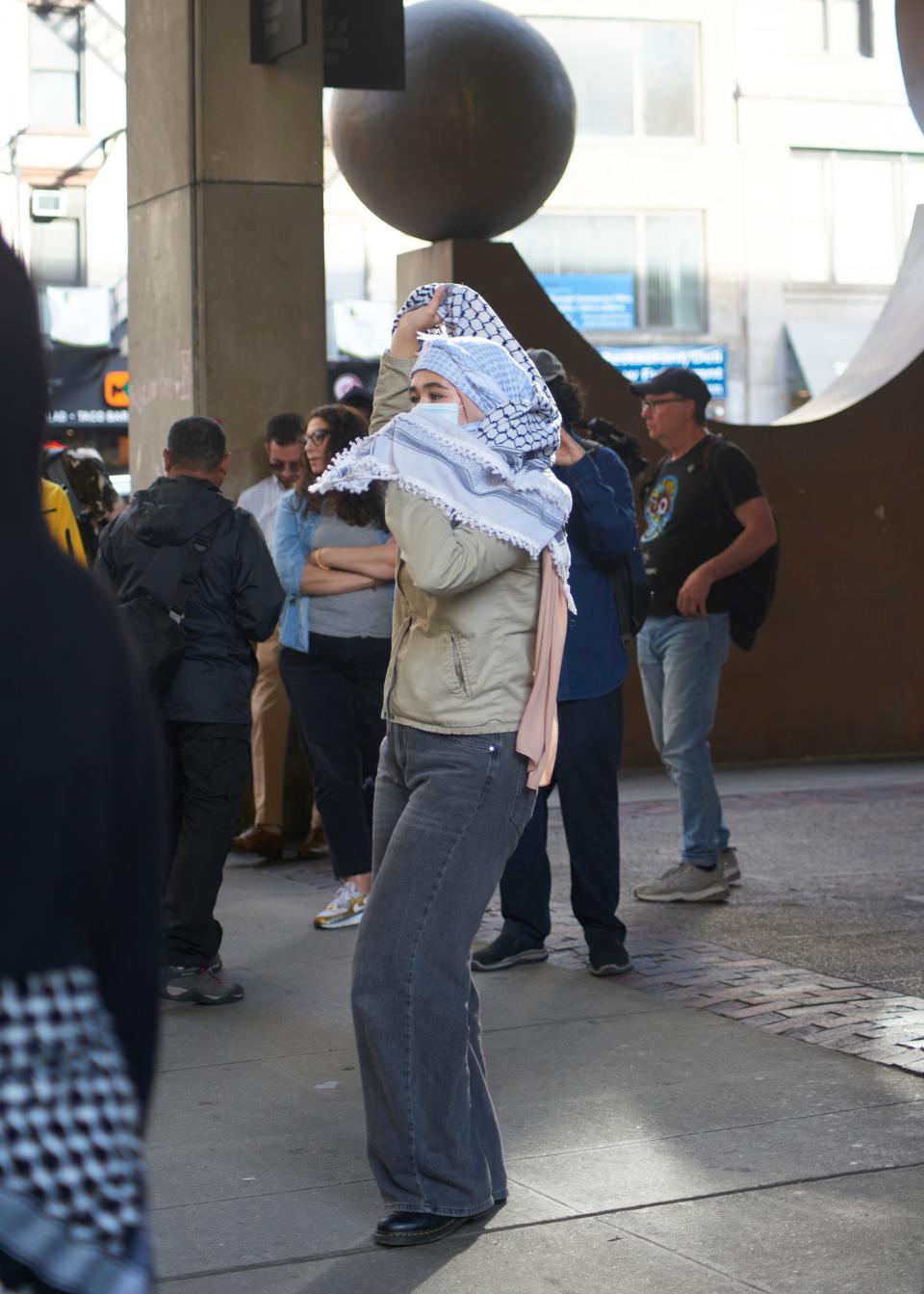
Like the keffiyeh: It's so important to so many people around the world. Personally, the keffiyeh that I wear to this day, a black and red one, is one that I got as a child. I'm Muslim, I come from a Muslim background, and my family has always been practicing Islam.
It makes the most sense for us to stand up and push for an act of change now. Fashion is deeply rooted in so many different things around the world. For people to question why fashion students are getting up and speaking and saying something and making a stance, it's like, “Do you not understand?” You can actively see that young men and women, young children, mothers and fathers, grandparents, are being murdered day by day, every single day, people are being dragged out under the rubble. It's very clear what's going on.
Calling for an end to the genocide in Palestine is not antisemitism; speaking up against what's going on to people around the world is not antisemitic. It kind of sucks to see.
A lot of us want to be at these luxury companies and work within the industry. A lot of us want to be journalists. How can we not rely on the people who are ahead of us and supposed to be guiding us?
We really urge fashion industry leaders and people within the fashion industry to stand up and recognize that the grassroots and the students are up and speaking now. It's a moment for them to come out and speak alongside us, to lock arms, just like how we have been doing with our fellow students. Being our guiding lights and mentors, obviously, they understand the industry more than we do. They understand the things that are going on.
Obviously, we don't want to be in a position where we're scared of being doxxed or being told that we can't work at some company because five years ago we chose to say “Free Palestine.” We urge all fashion industry leaders and people within the industry, or the creative industry as a whole, to not be afraid of what their job description holds them to, but to understand their personal human values.
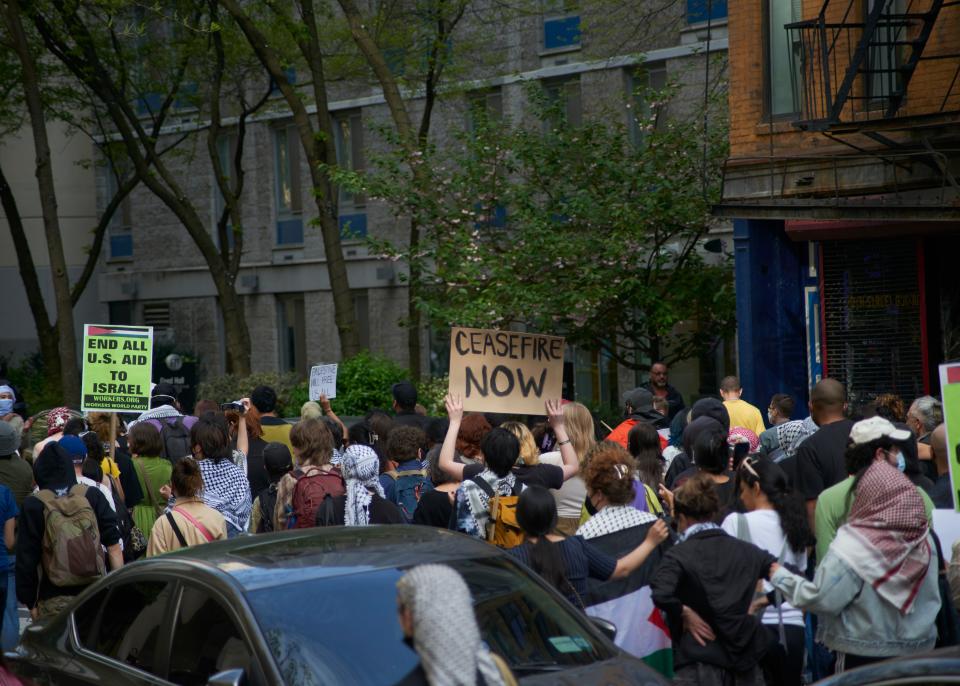
When reached for comment, SUNY provided a statement reading in part: “Consistent with our mission and federal and New York State law, including the U.S. and New York State Constitutions, campuses are responsible for both freedom of expression and ensuring a safe learning environment for all of our students.”
And from FIT: "There is a small outdoor encampment. We are monitoring and managing the situation to ensure the safety of the entire FIT community, which remains our highest priority.”
Stay up-to-date with the politics team. Sign up for the Teen Vogue Take
Originally Appeared on Teen Vogue
More great activism coverage from Teen Vogue:

